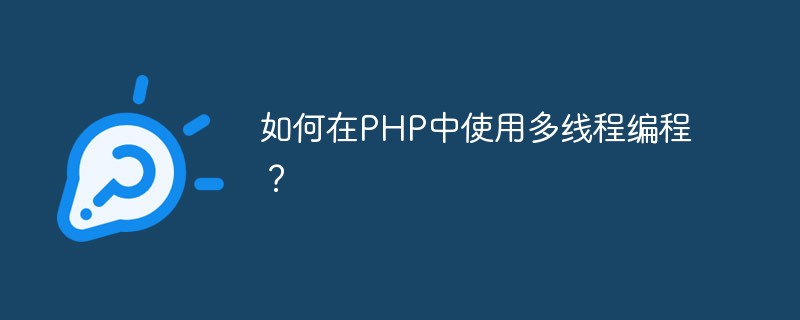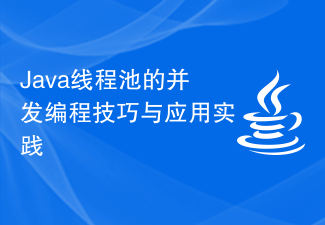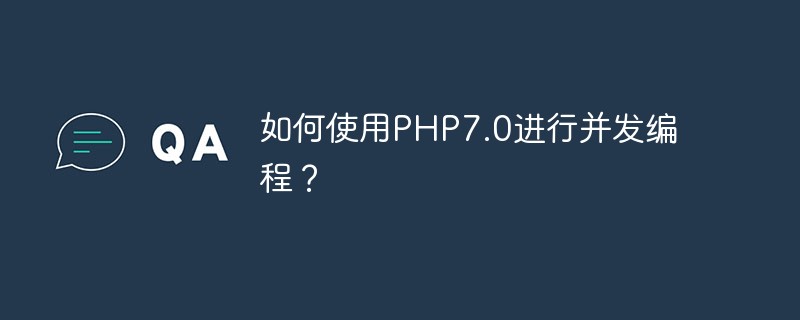
Golang is a popular programming language known for its simplicity, efficiency, and concurrent performance. However, even experienced developers make some common mistakes during Golang development. This article aims to list some common pitfalls and provide some advice on how to avoid them.
- Don’t ignore error handling
In Golang, error handling is a very important part. It is possible, but not recommended, to use panic/recover to handle errors. They should be reserved for serious errors and not for handling general errors. When an error occurs in your code, you should use the method of returning an error value to notify the caller and take appropriate action if necessary.
- Avoid improper use of concurrency
Golang is a language with excellent concurrency support, but incorrect use of concurrency may lead to race conditions and other concurrency problems . Be careful when writing concurrent code. Use a mutex (Mutex) to protect shared resources and prevent multiple coroutines from modifying them at the same time. Channels can also be used to implement communication between coroutines to avoid race conditions and deadlocks.
- Pay attention to the pitfalls of slices
Slices are one of the commonly used data structures in Golang. But when using slicing, pay special attention to the relationship between pointers and underlying arrays. When two slices use the same underlying array, modifications to one slice may affect the other. This may cause unexpected side effects. Therefore, when making modifications to a slice, it is best to use the copy function to create a new slice.
- Don’t abuse defer
defer is a very useful keyword in Golang, which can be used to perform some cleanup work before the function returns. However, misuse of defer can cause performance issues, especially when using defer in a loop. A defer will be created in each iteration, which will bring additional overhead. If you need to use defer in a loop, consider placing it in an anonymous function inside the loop.
- Handle string concatenation with caution
String concatenation is a common operation in development, but be careful not to abuse it. Each concatenation of a string creates a new string object, which can cause performance issues. If you need to splice a large number of strings, you can use the bytes.Buffer class to perform efficient string splicing operations.
- Don’t ignore the return value of the error handling function
Many standard library functions in Golang will return an error value, indicating whether an error occurred during the execution of the function. When calling these functions, pay attention to appropriate handling of their return values. Do not ignore these return values, otherwise unhandled errors may result.
- Understand memory management
Golang has an automatic memory management mechanism and does not require manual release of memory. However, incorrect memory management can lead to memory leaks and performance issues. When writing code, pay attention to promptly releasing variables and data structures that are no longer used to avoid memory leaks.
To sum up, it is very important to avoid common error traps in the Golang development process. We should pay attention to error handling, use concurrency correctly, be aware of slicing traps, use defer carefully, handle string concatenation carefully, handle error return values correctly, and understand memory management. By avoiding these error traps, we can better develop efficient and stable Golang applications.
The above is the detailed content of Golang Development Notes: Avoid Common Mistakes and Traps. For more information, please follow other related articles on the PHP Chinese website!
 如何在PHP中使用多线程编程?May 12, 2023 am 08:39 AM
如何在PHP中使用多线程编程?May 12, 2023 am 08:39 AM随着Web应用程序变得越来越庞大和复杂,传统的单线程PHP开发模式不再适用于高并发处理。在这种情况下,使用多线程技术可以提高Web应用程序处理并发请求的能力。本文将介绍如何在PHP中使用多线程编程。一、多线程概述多线程编程是指在一个进程中并发执行多个线程,每个线程都能单独访问进程中的共享内存和资源。多线程技术可以提高CPU和内存的使用效率,同时可以处理更多的
 Golang语言特性揭秘:并发编程与多线程同步Jul 17, 2023 am 09:48 AM
Golang语言特性揭秘:并发编程与多线程同步Jul 17, 2023 am 09:48 AMGolang语言特性揭秘:并发编程与多线程同步Golang是一种现代化的编程语言,被设计用于解决大规模并发问题。它的并发编程模型让开发人员可以轻松地创建并管理多个goroutine,实现高效的并发执行。在本文中,我们将揭秘Golang的并发编程特性,并探讨如何在多线程中进行同步。Golang的并发编程模型基于goroutine和channel。gorouti
 Java线程池的并发编程技巧与应用实践Jun 15, 2023 pm 11:25 PM
Java线程池的并发编程技巧与应用实践Jun 15, 2023 pm 11:25 PMJava线程池的并发编程技巧与应用实践随着互联网和移动互联网的普及,并发访问量变得越来越大,传统单线程编程方式已经无法满足大规模并发的需求。Java线程池充分利用CPU资源,实现高效并发编程,是面向对象编程中不可或缺的一部分。本文从Java线程池的基本原理入手,介绍了线程池的核心参数配置、使用方法、线程池的应用场景及其优化策略。一、Java线程池基本原理J
 如何利用 Go 语言进行并发编程?Jun 10, 2023 am 10:33 AM
如何利用 Go 语言进行并发编程?Jun 10, 2023 am 10:33 AM随着计算机硬件的不断发展,处理器中的CPU核心不再单独增加时钟频率,而是增加核心数量。这引发了一个显而易见的问题:如何发挥这些核心的性能?一种解决方法是通过并行编程,即同时执行多个任务,以充分利用CPU核心。这就是Go语言的一个独特之处,它是一门专为并发编程而设计的语言。在本文中,我们将探讨如何利用Go语言进行并发编程。协程首先,我们需要了解
 PHP中的并行编程技术May 23, 2023 pm 07:21 PM
PHP中的并行编程技术May 23, 2023 pm 07:21 PM随着互联网的快速发展,大型Web应用程序的开发变得越来越流行。在这种情况下,一个Web应用程序需要处理来自数百甚至数千个用户的请求。这就需要并行编程技术,以便在处理多个请求时提高程序的性能。PHP是一个流行的脚本语言,广泛用于Web应用程序的开发。PHP提供了多种并行编程技术,包括多进程、多线程和异步编程。在本文中,我们会介绍这些技术,以及它们如何帮助我们实
 如何使用PHP7.0进行并发编程?May 28, 2023 am 08:51 AM
如何使用PHP7.0进行并发编程?May 28, 2023 am 08:51 AMPHP7.0是当前最常用的服务器端编程语言之一。它界面友好、易于学习,功能强大,具有丰富的扩展库。在并发编程方面,PHP7.0也有许多优秀的工具和技术。本文将介绍如何在PHP7.0中进行并发编程。一、什么是并发编程并发编程是指通过多个线程,进程或协程等方式,使多个任务在同一时间内同时执行的编程方式。在编程中,有效地使用并发技术可以提高程序的性能和吞吐量。二、
 Golang并发编程探索之Goroutines的线程模型详解Jul 17, 2023 pm 10:24 PM
Golang并发编程探索之Goroutines的线程模型详解Jul 17, 2023 pm 10:24 PMGolang并发编程探索之Goroutines的线程模型详解在当今互联网时代,高并发成为了各种系统开发中非常重要的一个课题。传统的单线程编程模型很难以满足大量并发请求的需求,而在很多编程语言中,多线程编程也存在着复杂的竞态条件、死锁等问题。而在Golang中,通过轻量级的Goroutines和基于通信的并发模型,使得并发编程变得更加简单和高效。Gorouti
 在Beego中使用Akka实现并发编程Jun 23, 2023 am 08:16 AM
在Beego中使用Akka实现并发编程Jun 23, 2023 am 08:16 AM随着互联网的不断发展,高并发和分布式是大多数Web应用程序所面临的挑战。许多框架和工具已经被开发出来,以便用于解决这些挑战,而在这些框架和工具中,Beego和Akka是非常好的例子。Beego是一个开源的Web应用框架,而Akka是一个强大的并发编程框架,它能够使分布式应用程序更容易开发和维护。本文将介绍如何在Beego中使用Akka来实现并发编程。一、A


Hot AI Tools

Undresser.AI Undress
AI-powered app for creating realistic nude photos

AI Clothes Remover
Online AI tool for removing clothes from photos.

Undress AI Tool
Undress images for free

Clothoff.io
AI clothes remover

AI Hentai Generator
Generate AI Hentai for free.

Hot Article

Hot Tools

Dreamweaver CS6
Visual web development tools

DVWA
Damn Vulnerable Web App (DVWA) is a PHP/MySQL web application that is very vulnerable. Its main goals are to be an aid for security professionals to test their skills and tools in a legal environment, to help web developers better understand the process of securing web applications, and to help teachers/students teach/learn in a classroom environment Web application security. The goal of DVWA is to practice some of the most common web vulnerabilities through a simple and straightforward interface, with varying degrees of difficulty. Please note that this software

WebStorm Mac version
Useful JavaScript development tools

Atom editor mac version download
The most popular open source editor

MinGW - Minimalist GNU for Windows
This project is in the process of being migrated to osdn.net/projects/mingw, you can continue to follow us there. MinGW: A native Windows port of the GNU Compiler Collection (GCC), freely distributable import libraries and header files for building native Windows applications; includes extensions to the MSVC runtime to support C99 functionality. All MinGW software can run on 64-bit Windows platforms.






